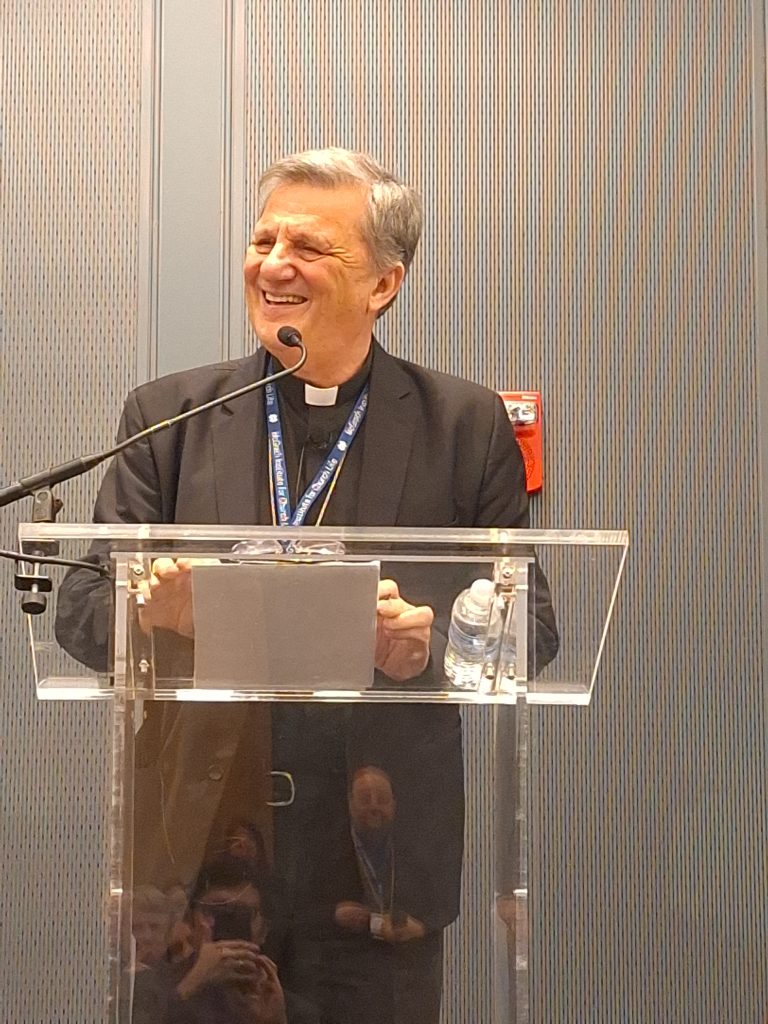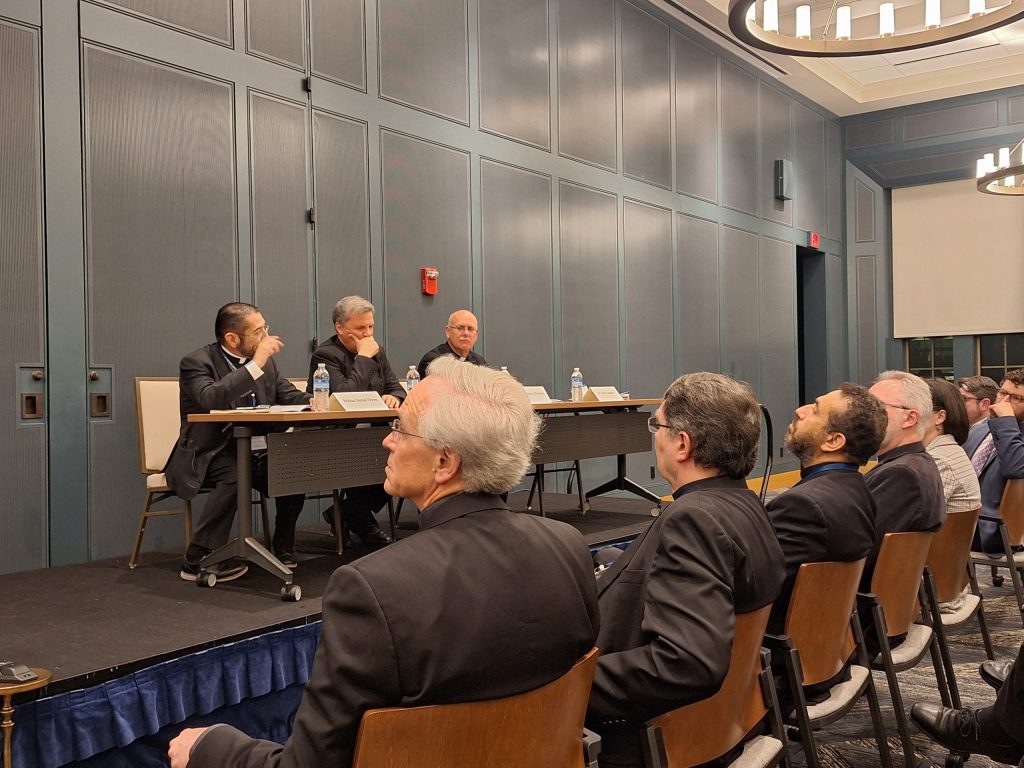March 5, 2024 // Bishop
Cardinal Grech Invites Bishops into ‘Synodal Conversion’
It will take work – listening to the Holy Spirit speaking in local dioceses – for bishops to experience the conversion required by the synodal model of Church espoused by Pope Francis, and this conversion is essential because of the special role bishops play in the Church, the Vatican official tasked with leading the synod process told a gathering at the University of Notre Dame the evening of Monday, February 26.
“While the vision of the synodal Church is one that invites participation on the part of all the baptized, the bishop plays a crucial role in creating a synodal atmosphere throughout his diocese. There is no synod without the bishop,” said Cardinal Mario Grech, Secretary General of the Synod of Bishops, the Vatican office overseeing the yearslong journey of consultation, dialogue, and discernment that Pope Francis has made a defining project of his pontificate.

Cardinal Mario Grech, Secretary General of the Synod of Bishops, speaks during his keynote address on Monday, February 26, at the University of Notre Dame.
Addressing a crowd that included Cardinal Christophe Pierre, Apostolic Nuncio to the United States, more than a dozen U.S. bishops, and students, faculty, and other members of the Notre Dame community, Cardinal Grech asserted that it will require ongoing formation on the part of bishops to become synodal bishops.
“Ongoing spiritual formation, as an element of the bishops’ ongoing synodal conversion, will include a … commitment to dialogue, the spiritual art of listening to the guidance of the Holy Spirit,” the cardinal said. He also repeated the entreaty of Pope Francis to “listen to what the Spirit is saying to the Church.”
Cardinal Grech, 67, is a native of Malta who has headed the Vatican’s synod office since 2020, the same year Pope Francis made him a cardinal. His address served as the opening keynote – and the only public portion – of a three-day conference for U.S. bishops on “The Place of Episcopal Discernment in the Synodal Journey,” co-sponsored by the U.S. Conference of Catholic Bishops and the McGrath Institute for Church Life at Notre Dame.
The culmination of a multi-year, global consultation process, the synod is currently between two essentially monthlong sessions in Rome, the first of which took place in in October of 2023 and the second of which will be held this coming October. In the interim, the Vatican has asked the world’s dioceses to once again consult their people, posing the questions of: Where have Catholics experienced successes and distresses in the Church that have helped or hindered the mission; and, how can the Church help all baptized people proclaim the Gospel and live as a community of love and mercy in Christ?

Photos by Don Clemmer
From left, Bishop Daniel Flores of Brownsville, Texas, Cardinal Mario Grech, and Bishop Rhoades speak during a conversation regarding synodality in the Church at the University of Notre Dame on Monday, February 26.
Cardinal Grech emphasized that being a synodal bishop is a matter of style, how a bishop engages his people, from a posture of listening and being present. Drawing extensively on the documents of the Second Vatican Council, especially Lumen Gentium, the 1964 Dogmatic Constitution on the Church, Grech noted that a bishop does this by promoting an appropriate sense of co-responsibility among laypeople and encouraging the practice of prayerful listening to the Holy Spirit.
Recognizing that being a bishop in a Church conceived in a synodal way is not an easy task, Cardinal Grech stressed that “I sincerely believe that the way of synodality can be energizing,” as well as empowering and liberating. He added, “I am convinced that what Pope Francis calls a synodal Church, a Church which listens, is indeed in harmony with the Gospel.”
On the need for ongoing conversion, even among bishops, he said: “I also believe that the pope’s call regarding synodality is a vision that seeks to embed more deeply into the life of the Church the personal renewal and institutional reform that Vatican II was seeking to promote. However, we are still far from realizing that conciliar program into the life of the Church.”
In a response delivered in his capacity as local diocesan bishop and a delegate to the synod, Bishop Rhoades picked up on the call for ongoing formation of bishops. Cardinal Grech noted that the word “formation” appeared 55 times in the final report of the 2023 synod gathering, and yet the document never used the word in reference to the formation of bishops.
Bishop Rhoades expressed his gratitude for drawing on the teaching of Pope St. John Paul II on the four pillars of formation: human, spiritual, intellectual, and pastoral.
“All four areas are essential for us, for our own formation, not only in synodality but in all that we do,” Bishop Rhoades said. He added that, in addition to the teachings of Vatican II, which Cardinal Grech recommended as an authoritative guide in embracing the synod process, that the bishops also benefit from the magisterial teachings of the post-conciliar popes and the Catechism of the Catholic Church as fruit of the council.
Bishop Rhoades also expressed gratitude for the cardinal’s role in shaping the synod journey.
“Your faith, kindness, and affability – and humility – guiding us this past October in Rome really illustrates the important qualities that you spoke about for synodal bishops,” said Bishop Rhoades. He recalled how Pope Francis opened the synod by inviting the delegates to open themselves to the Holy Spirit, the protagonist of the journey on which they were embarking, and noted, “One of the best parts of the experience I had there was really the atmosphere of prayer, conversations in the Spirit.”
Bishop Daniel Flores of Brownsville, Texas, Chairman of the USCCB Committee on Doctrine and leader of the U.S. effort to implement the synod, said the exchange between Cardinal Grech and Bishop Rhoades would benefit the entire Church in navigating and embracing the synod process.
“We should not lose sight of the importance of the local groundwork that goes on in deepening our perceptions of the way the Lord and His mystery operates amongst us,” Bishop Flores said.
Julia King, an alumna of Notre Dame’s Master of Divinity program, currently serving in parish ministry in South Bend, said she appreciated the spirit of co-responsibility – of laypeople having an important role in the life of the Church in cooperation with clergy and religious – that ran through Cardinal Grech’s talk and the response from Bishop Rhoades.
“It was just really beautiful to hear that,” she said.
The best news. Delivered to your inbox.
Subscribe to our mailing list today.






